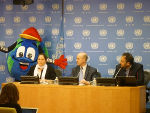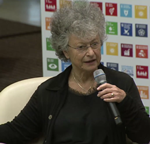Published on Thu, 2016-05-05 00:00
The Panama Papers have helped expose how politicians, criminals and corporations around the world hide their cash and avoid taxes. In Papua New Guinea (PNG), foreign owned logging companies are profiteering, using some of the same tricks. Recent research by the Oakland Institute revealed that most logging companies operating in the country are not paying corporate tax. Despite decades of operations and the country being today the largest exporter of tropical timber in the world, logging companies barely declare any profit. This deprives PNG of hundreds of millions of dollars in much needed revenue. |
Published on Fri, 2016-04-29 11:21
While all human rights are indivisible, economic and social rights entail specific principles that bear relevance for tax policy. Economic and social rights require that states devote maximum available resources to their progressive realization. The principle of non-retrogression sets forth that states should not take measures that deliberately lead to retrogression on the enjoyment of such rights. States also have an immediate obligation to ensure the satisfaction of, at the very least, minimum essential levels of economic, social and cultural rights. |
Published on Wed, 2016-04-27 11:27
Aldo Caliari, Director of the Rethinking Bretton Woods Project at the Center of Concern, reports on the outcomes of the first ECOSOC Financing for Development Forum that took place April 18 to 20, 2016 in New York. The Forum was intended to be the centerpiece of a reinvigorated follow up to the Financing for Development process created by the Third Financing for Development Conference held in Addis Ababa in 2015. "[...] those observing the first event to follow up on [2015's] commitments were suddenly awakened to the bitter reality of transitioning from paper to the realities of implementation." |
Published on Tue, 2016-04-26 10:54
During the debate on “achieving the Sustainable Development Goals” held in the framework of the ECOSOC Meeting at the UN, Barbara Adams from Global Policy Forum and Social Watch said that we are having a situation where governments on one hand singed a climate change agreement and on the other hand are pushed by bilateral investment treaties that are obstacles in many cases to be able to achieve the Sustainable Development Goals. |
Published on Fri, 2016-04-22 13:48
The traditional definition of aid is being eroded at the same time that governments have committed to achieving the UN's ambitious Sustainable Development Goals (SDGs), Jeffrey Sachs, special adviser to the UN Secretary-General on development, told IPS Thursday. "A lot of governments have a kind of magical thinking which is, we're all for the Sustainable Development Goals but don't come to us if you want to achieve them, go borrow from the private markets," said Sachs. Aldo Caliari, who represents civil society in UN Financing for Development (FfD) negotiations, told journalists here Monday that there has been a "significant shift in the language" in these negotiations towards "a larger presence of the private sector". |
SUSCRIBE TO OUR NEWSLETTER







